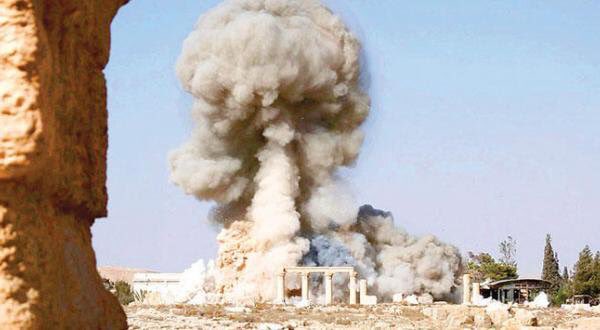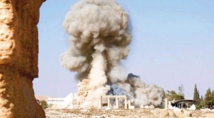Syrian forces battled IS fighters Saturday inside Palmyra, a strategically located ancient city, under the cover of Russian and Syrian artillery fire.
After capturing the town of Al-Amiriyah on the city's northern outskirts, regime forces fought their way into Palmyra's northern and western districts.
"The battle for Palmyra is in the final stages, as fighting is now inside the city itself," a Syrian military source on the outskirts of Palmyra said.
An AFP journalist on a western hilltop overlooking Palmyra saw nearby artillery operated by Russian and Syrian troops firing on IS positions in the city.
As heavy winds whipped up the desert sand, helicopters circled nearby and a Russian officer carrying binoculars surveyed the partially destroyed ruins below.
Drone footage released by a Russian television station shows collapsed archeological structures in the sprawling Greco-Roman old city but with the amphitheatre largely intact.
Even as clashes raged in residential neighbourhoods on Saturday, the ruins remained eerily quiet, without a single fighter in sight.
The military source said the site was likely "rigged with explosives" and being watched by nearby IS snipers.
- Russia 'widely involved' -
Russia was "widely involved in the battle for Palmyra, whether in fighting directly on the ground, with their planes, or by intercepting communication" among IS fighters, the source said.
Saturday's success, he told AFP, could be attributed to the "tactical experience" that Syria's army had gleaned from the Russian forces, as well as new joint operations rooms near Palmyra.
Despite a major drawdown last week, Russian warplanes have continued their bombing campaign around Palmyra, conducting more than 40 combat sorties in the past 24 hours targeting "158 terrorist" positions, according to the Russian defence ministry.
But with pro-government forces now engaged in street battles with the jihadists, raids have markedly decreased.
IS overran the Palmyra ruins and adjacent modern city in May 2015, sparking a global outcry and fears for the UNESCO world heritage site known as the "Pearl of the Desert".
The group has since blown up UNESCO-listed temples and looted relics that dated back thousands of years.
Government forces began their large-scale offensive to retake Palmyra earlier this month, but Saturday marked the most significant advance yet.
"This is the fiercest offensive in the last three weeks," said Rami Abdel Rahman, head of the Britain-based Syrian Observatory for Human Rights which monitors the war.
"Regime forces have seized two neighbourhoods in the city's west and northwest in a simultaneous push," he told AFP.
IS was putting up a fight, however, with 10 government forces killed overnight in a car bomb west of the city, Abdel Rahman said.
Elsewhere in Syria, a ceasefire in areas held by the government and non-jihadist rebels has largely held since February 27, in a boost to diplomatic efforts to end a five-year war that has killed more than 270,000 people.
- First major defeat? -
The government's fresh advance on Saturday builds on gains made by pro-regime forces in the city's southwestern outskirts in recent days.
State news agency SANA reported that Syria's armed forces had "launched several operations at dawn (Saturday) towards the Gardens District south of the city" and near the airport to the city's east.
If Syrian forces take the city, "it will be the first major defeat of Daesh by the Syrian army," the military source said, using an Arabic acronym for IS.
"The army will have regained confidence and morale, and will have prepared itself for the next expected battle in Raqa."
The northern city of Raqa is the de facto capital of IS's self-styled "caliphate" which covers swathes of territory in Syria and neighbouring Iraq.
With the road linking Palmyra to Raqa now under army control, IS fighters in the ancient city can only retreat eastwards towards the Iraqi border.
The Pentagon announced on Friday it will propose boosting the US military presence in Iraq, whose army said this week it had launched a long-awaited offensive to retake the key IS hub of Mosul.
The recommendations will include ways that the US can "enable" Iraqi forces in their efforts to recapture Mosul, the largest urban centre in IS's territory -- an operation that is expected to be long and difficult.
-----------------------------------------------------------------------------------------------------------------------
After capturing the town of Al-Amiriyah on the city's northern outskirts, regime forces fought their way into Palmyra's northern and western districts.
"The battle for Palmyra is in the final stages, as fighting is now inside the city itself," a Syrian military source on the outskirts of Palmyra said.
An AFP journalist on a western hilltop overlooking Palmyra saw nearby artillery operated by Russian and Syrian troops firing on IS positions in the city.
As heavy winds whipped up the desert sand, helicopters circled nearby and a Russian officer carrying binoculars surveyed the partially destroyed ruins below.
Drone footage released by a Russian television station shows collapsed archeological structures in the sprawling Greco-Roman old city but with the amphitheatre largely intact.
Even as clashes raged in residential neighbourhoods on Saturday, the ruins remained eerily quiet, without a single fighter in sight.
The military source said the site was likely "rigged with explosives" and being watched by nearby IS snipers.
- Russia 'widely involved' -
Russia was "widely involved in the battle for Palmyra, whether in fighting directly on the ground, with their planes, or by intercepting communication" among IS fighters, the source said.
Saturday's success, he told AFP, could be attributed to the "tactical experience" that Syria's army had gleaned from the Russian forces, as well as new joint operations rooms near Palmyra.
Despite a major drawdown last week, Russian warplanes have continued their bombing campaign around Palmyra, conducting more than 40 combat sorties in the past 24 hours targeting "158 terrorist" positions, according to the Russian defence ministry.
But with pro-government forces now engaged in street battles with the jihadists, raids have markedly decreased.
IS overran the Palmyra ruins and adjacent modern city in May 2015, sparking a global outcry and fears for the UNESCO world heritage site known as the "Pearl of the Desert".
The group has since blown up UNESCO-listed temples and looted relics that dated back thousands of years.
Government forces began their large-scale offensive to retake Palmyra earlier this month, but Saturday marked the most significant advance yet.
"This is the fiercest offensive in the last three weeks," said Rami Abdel Rahman, head of the Britain-based Syrian Observatory for Human Rights which monitors the war.
"Regime forces have seized two neighbourhoods in the city's west and northwest in a simultaneous push," he told AFP.
IS was putting up a fight, however, with 10 government forces killed overnight in a car bomb west of the city, Abdel Rahman said.
Elsewhere in Syria, a ceasefire in areas held by the government and non-jihadist rebels has largely held since February 27, in a boost to diplomatic efforts to end a five-year war that has killed more than 270,000 people.
- First major defeat? -
The government's fresh advance on Saturday builds on gains made by pro-regime forces in the city's southwestern outskirts in recent days.
State news agency SANA reported that Syria's armed forces had "launched several operations at dawn (Saturday) towards the Gardens District south of the city" and near the airport to the city's east.
If Syrian forces take the city, "it will be the first major defeat of Daesh by the Syrian army," the military source said, using an Arabic acronym for IS.
"The army will have regained confidence and morale, and will have prepared itself for the next expected battle in Raqa."
The northern city of Raqa is the de facto capital of IS's self-styled "caliphate" which covers swathes of territory in Syria and neighbouring Iraq.
With the road linking Palmyra to Raqa now under army control, IS fighters in the ancient city can only retreat eastwards towards the Iraqi border.
The Pentagon announced on Friday it will propose boosting the US military presence in Iraq, whose army said this week it had launched a long-awaited offensive to retake the key IS hub of Mosul.
The recommendations will include ways that the US can "enable" Iraqi forces in their efforts to recapture Mosul, the largest urban centre in IS's territory -- an operation that is expected to be long and difficult.
-----------------------------------------------------------------------------------------------------------------------









 Home
Home Politics
Politics











